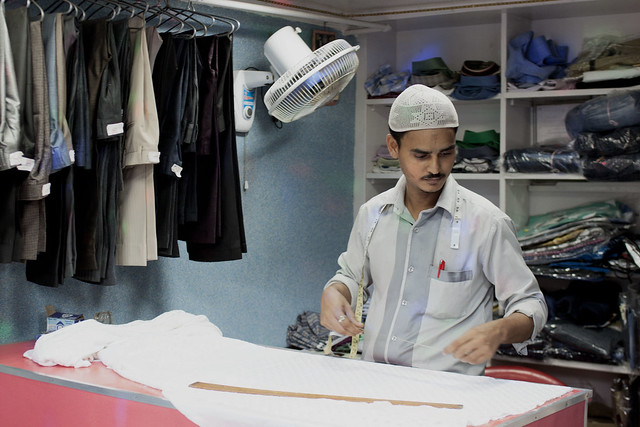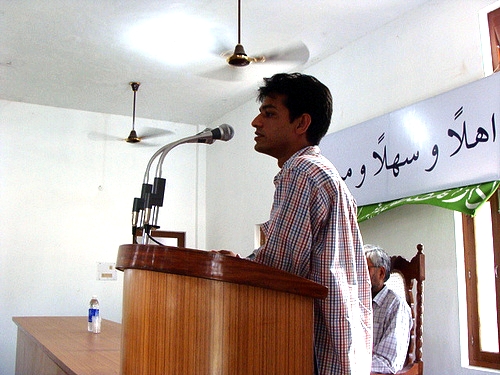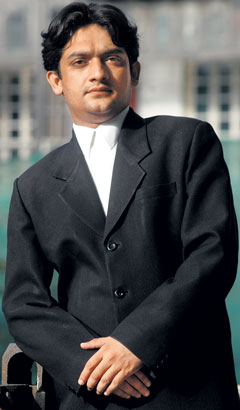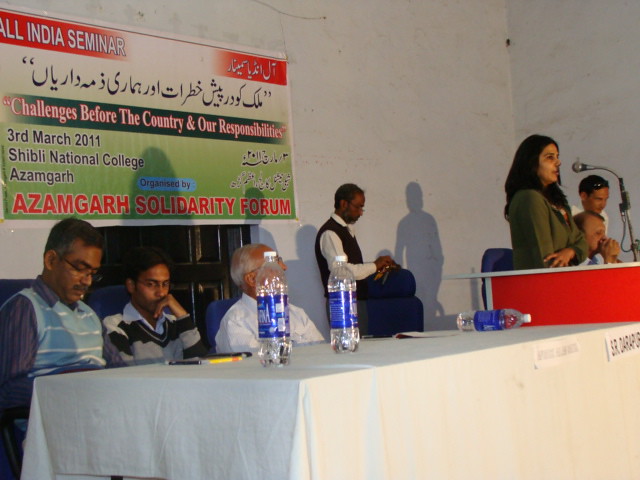Jamait Ulama-i-Hind (JUH) using terror cases for popularity: Adv. Khalid Azmi . Brother of late Shahid Azmi also alleges that JUH has disowned his brother
By Mohd. Ismail Khan, TwoCircles.net
In the beginning of 2012, when Advocate Khalid Azmi younger brother of slain Advocate Shahid Azmi withdrew from all the terror cases he was fighting on behalf of Jamiat Ulama-i-Hind (Arshad Madani faction), it raised many eyebrows. Feud was apparent, but Advocate Khalid preferred to keep quiet at that time. Now Khalid Azmi, in this exclusive interview with TwoCircles.net, for the first time spoke on his withdrawal and the issues he had with JUH. He says he wanted to clear the air; the reason he says behind the hostility between him and JUH was that the later was deserting the legacy of Shahid Azmi, the man who helped JUH ride on top of the popularity charts of Muslim organizations.
![]()
Advocate Khalid Azmi
Anyone who has some familiarity with terror cases in the country can never deny that Adv. Shahid Azmi was the main force which shaped Jamiat Ulama as the major NGO fighting terror cases and challenging the establishment on the terror witch-hunt of Muslim youth.. Khalid Azmi said his brother Shahid Azmi, with much efforts single-handedly convinced JUH for a need to have a centralised mechanism to fight terror cases in the courts of law. Out of the 26 odd terror cases which JUH today is fighting, nearly 20 of them was provided by Shahid Azmi. Khalid claim those terror cases became a big publicity boost for JUH.
But now Khalid says that after the assassination of his brother, JUH literally disowned all his contributions. The reason, Khalid says, is that JUH declined to look after Shahid Azmi assassination case. JUH, according to Khalid, “didn't even bother to ask even once the status of the case.” He says that as he was still not very experienced and hence appointed senior advocates to monitor his brother’s assassination case, JUH leadership told him abruptly that is ‘Fizul Kharchi (waste of money)’.
State which is the main prosecutor in the Shahid Azmi murder case since the beginning didn't take the case seriously, with accused easily getting out on bail and even as MCOCA Court has removed Maharashtra Control of Organized Crime Act, 1999 charges against the accused. Those charges were restored only after Khalid, with the help of some senior advocates approached the High Court, although the accused has again appealed in the Supreme Court. Even after all this high drama in courts, JUH didn't bother to intervene with its vast legal team of criminal lawyers, alleges Khalid.
![]()
Shahid Azmi was killed on Feb 11, 2010.
Advocate Khalid Azmi who was working on 7/11 blasts, Malegaon blast, and many other terror cases for JUH, said that he finally gave up when JUH asked him to collect half of the legal expenses from the accused families’ and that the organisation would bear only half of the cost. Khalid said that most of the terror accused were from economically poor background and he didn’t like collecting money from the oppressed. “The main reason behind keeping Jamiat in the forefront of fighting terror cases was to ensure that Muslim community will bear all the legal cost for the innocent youths framed in false charges, I seriously believe the basic aim is now being diluted by Jamiat,” said Khalid.
Now he feels Jamiat is concentrating more on show-jumping popularity map than to provide justice and legal aid to terror arrest victims. “Even if a leaf moves in a terror case, they will make a huge propaganda about it, it often affect the legal trials. Their basic purpose now seems clear, to reap as much benefit and popularity as you can from fighting terror cases.” Khalid also gave an example of news item published recently and distributed widely where Jamiat filed a petition in the court asking it to provide special Iftar arrangements for the accused. “Even before court could decide on its petition Jamiat showed off that even moving a petition on behalf of terror accused is a big philanthropy activity by them for those accused.”
Khalid Azmi also lamented that there is apathy in fighting those 26 odd terror cases in the court of law which nearly hold the future of hundreds of Muslim youths. “There is a need to appoint senior advocates in many high profile serious cases, but Jamiat is not taking any interest in this crucial aspect, even though they are collecting huge amount of funds from Muslim community on the promise of providing valuable legal aid to innocent terror accused.”
Advocate Khalid Azmi who had his last stint with JUH in January 2012 while fighting the case and acquiring bail of four Muslim youths from Bihar arrested from Punjab by Maharashtra ATS, said Jamiat’s fund collection has increased three fold after Shahid Azmi put them in forefront of fighting terror cases. “If one gets into investigating the collection and usage of funds one can find lot of misappropriations in it,” he alleges.
Even as a Bollywood movie is being made on the life, dedication and sacrifices of Shahid Azmi, his family alleged the very organization that Shahid kept close to his heart is now discarding all his efforts.
Kahlid Azmi gloomily puts that Jamiat ul Ulema didn’t even consider justice for Shahid Azmi who has provided them all the lift through his personal selfless efforts, even at the cost of his precious life. Now Khalid said he is personally monitoring his brother’s assassination case and after how Jamiat has humiliated the legacy of Shahid Azmi, he will never want them to get into this case, and will never allow them to use his martyr brother’s name again.
Jamiat ul Ulema responds to the allegations:
Jamiat Ulama since 2006 has been enjoying strong credibility among Indian Muslim community for fighting terror cases. With charges of this magnitude leveled against them by Advocate Khalid Azmi, first time they are caught in middle of controversy, over their style of functioning.
When TwoCircles.net contacted JUH legal cell chief Gulzar Azmi he got agitated on the accusations, but he conceded that Jamiat willingly didn’t intervene in Shahid Azmi’s assassination case as they believed that it is a ‘state matter’.“Shahid Azmi’s assassination case is a police case, and in all murder cases it is the government which is the prosecutor, the pleader appointed by the government will fight it in the court, there are some legal principles to follow,” he said.
![]()
Gulzar azmi (left) with Yasmeen wife of Fahim Ansari and Usman brother of Fahim. Shahid played a major role in getting his acquittal.
But Jamiat legal chief agrees that there are provisions to interfere in the case, “Nonetheless, yes I agree, we could have acted in the case. There is a legal procedure to get the examination powers in our favor to fight the case, but those powers will be restricted by the state,” he said, adding, “Shahid Azmi assassination case is a police case, our duty is to concentrate only on terror case, why should we waste our money and energy on some other cases.”
Responding on the allegation of acquiring half of the legal charges amount from the terror accused, Gulzar Azmi said, “Yes we take half of the amount from the terror accused, but only in case of applying and acquiring bail. Huge amount of money is needed for bail bonds, if we paid for some of the accused others will also demand the same. So we decided to take half of the amount from every one,” but added, “In case of 2006 Malegaon blast case we paid complete bail bonds of 50,000 each for every accused, but that was different case.”
The most he loathed was the query on working just for publicity and irregularities in gathering of funds, its disposal, which are collected in the name of terror accused. Gulzar Azmi gave an imprecise answer, “If we are doing our work honestly and with dedication then it will be shown in our results, if we are doing this just for publicity with ulterior motives than it will also be shown in our outcomes. From whatever results we have produced till now fighting terror cases in the courts of law, evidence is clear for Indian Muslim community to judge us.”













